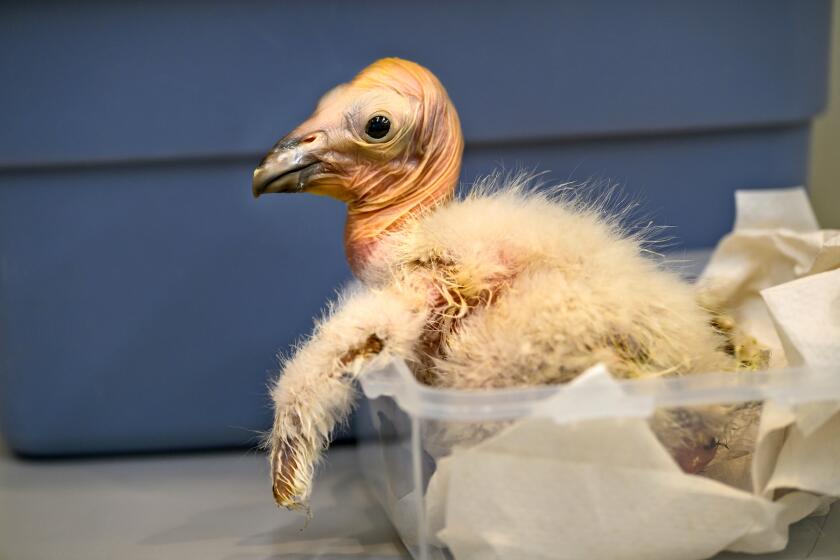Irvine Cancer Drug-Evaluation Lab Faces Test of Its Effectivenes : Medicine: Oncotech, which analyzes malignant tissues to determine the most effective therapies, will finally be the object of a controlled study.
Dr. Larry Weisenthal says his small laboratory in an industrial corner of Irvine is quietly making medical history.
“We could revolutionize the way cancer is treated and researched,” boasts Weisenthal, founder and vice president of Oncotech Inc.
Oncotech is one of some half a dozen laboratories around the country that analyze malignant tissues for doctors to determine the most effective drug therapies. Many physicians question the usefulness of in-vitro tumor testing, pointing out that its effectiveness has never been verified by the rigorous studies required for new drugs.
“What we are doing is by no means universally accepted,” Weisenthal concedes.
But proponents of the technology say it reduces the guesswork in weeding out drug therapies least likely to succeed for a particular patient, while pinpointing more promising ones.
“It saves us a lot of wasted time treating patients with drugs that have no chance of helping them,” said Richard Nalick, a prominent gynecological oncologist who teaches at the USC School of Medicine. Nalick added that he screens tumor biopsies through Oncotech before prescribing chemotherapy “whenever I possibly can.”
Weisenthal hopes that his more skeptical colleagues will warm up to the concept once he can support it with hard statistics. And it’s not for lack of trying that Oncotech’s procedures have never been put under a microscope. Ever since Weisenthal and fellow oncologist Robert Nagourney founded the firm six years ago, they have been beseeching cancer groups and hospitals to participate in a controlled study of the laboratory’s results.
Oncotech has finally found a taker. The Gynecological Oncology Group (GOG), a national physicians’ organization based in Philadelphia, recently agreed to cooperate in sending biopsies of malignant ovarian tumors to Oncotech--at the firm’s expense.
Laboratory researchers will test a battery of drugs on the tumor samples to predict which would work best. Without consulting Oncotech, physicians participating in the study will follow their normal procedures in prescribing drug treatments. After accumulating data on about 150 patients, the oncologists’ group and the National Cancer Institute will compare the drugs’ actual success rate against Oncotech’s prognoses.
“I would be astounded if the trial’s results did not come out in our favor,” said Weisenthal, a boyish-looking 44-year-old. “But if it turns out we’ve been wrong all along, we would be the last ones to want to continue marketing these services.”
Weisenthal and Nagourney co-founded Oncotech with $200,000 in grants from the Memorial Medical Foundation in Long Beach and the National Cancer Institute. Then a clinical investigator at Long Beach Veterans Administration Medical Center, Weisenthal had been experimenting for years with in-vitro tests developed in the 1970s at the UC Irvine and UCLA medical schools.
Nagourney, 37, eventually returned to private practice while Weisenthal stayed on at Oncotech. The small, 25-employee company is relatively unknown in the medical field. “I would guess that most oncologists have never heard of us,” Weisenthal allowed.
Oncotech analyzes about 300 biopsies and blood samples a month, delivered to the lab via express mail from cancer specialists around the country. Results are sent back to Oncotech clients within a week.
“In virtually every case where they (Oncotech) said a tumor would be resistant to a certain drug and I tried the drug anyway, they were right and I was wrong,” said Bruce Zietz, an oncologist and hematologist with West Hills Hospital in the San Fernando Valley.
Oncotech charges $890 to test a standard panel of seven or eight drugs used to treat a specific cancer. Some oncologists argue against spending that sum on a procedure that has been demonstrated only empirically.
“I’ve hesitated using Oncotech because studies like the one we’re trying to do have not been done in the past,” said Alberto Manetta, a UCI Medical Center gynecological oncologist who will head up the Philadelphia group’s review of Oncotech.
Nalick, on the other hand, sees in-vitro tumor inspection as both a frugal and essential step in cancer treatment. “It costs at least $1,000 a day to be in a hospital room, not to mention the fact that chemotherapy drugs cost at least another $30,000,” he said. “Suppose you’re doing all of that and the drugs aren’t even working? I believe that (Oncotech) is not only worth the money but can save lives as well.”
Most of Oncotech’s tests are performed for breast cancer patients, followed by ovarian, colon and lung cancer victims. It also analyzes blood samples from patients suffering from leukemia and other blood disorders.
A handful of laboratories are experimenting with in-vitro tumor testing. But only one other U.S. company markets the technique--tiny Analytical Biosystems Corp. in Warwick, R.I.
“I don’t consider Oncotech our rival,” Analytical Biosystems lab director Patricia Meitner said. “We’re working together to get the word out that these tests are a good thing.” Founded in 1988, Analytical Biosystems employs 10 people.
After six years in business, Oncotech has piled up losses of about $7 million. The company expects sales of $3 million this year, up from $1 million in 1989. The company plows most of the money left over after its bills are paid back into research and development, Weisenthal said.
Oncotech briefly flirted with going public last year, hoping to raise about $10 million in an initial public stock offering of 1.3 million shares. But the company postponed the offering when the Persian Gulf conflict made investors jittery.
“Our timing could not have been worse,” Weisenthal lamented. “But we won’t try again for a good while. The effort involved in getting ready to go public is so complicated and we’re so small that we would rather devote our efforts to getting on solid footing financially.”
Test-tube screening of drugs is a far cry from a miracle cure for cancer, observed Nagourney, now a consultant for Oncotech. A drug that tests positive for shrinking a tumor, after all, may merely prolong a patient’s life a few months.
“The procedure is only as good as the drugs it tests,” Nagourney said.
For that reason, Oncotech recently began experimenting with 50 unpatented drugs donated by the National Institute of Cancer. The institute ceased testing the drugs because of lack of funding.
If Oncotech finds a promising drug, Weisenthal said, it will try to link up with a large pharmaceutical company to help finance the costly tests necessary to gain federal approval to market the drug.
Meanwhile, Weisenthal confidently awaits the results of the Gynecological Oncology Group study. “It should give us a big boost,” he said.
Oncotech at a Glance
Founded in 1985, Oncotech Inc. is a privately held biotechnology firm that tests tissue samples of malignant tumors to determine possible drug treatments.
Headquarters: Irvine
President: Frank Kiesner
Founders: Drs. Larry Weisenthal and Robert Nagourney
Employees: 25
Business: Oncotech has screened about 300 biopsies and blood samples a month this year.
Cost of Product: $890, standard drug test
Sales: $3 million (1991 estimate)
Losses: The company has lost $7 million since 1985. Source: Oncotech Inc.



